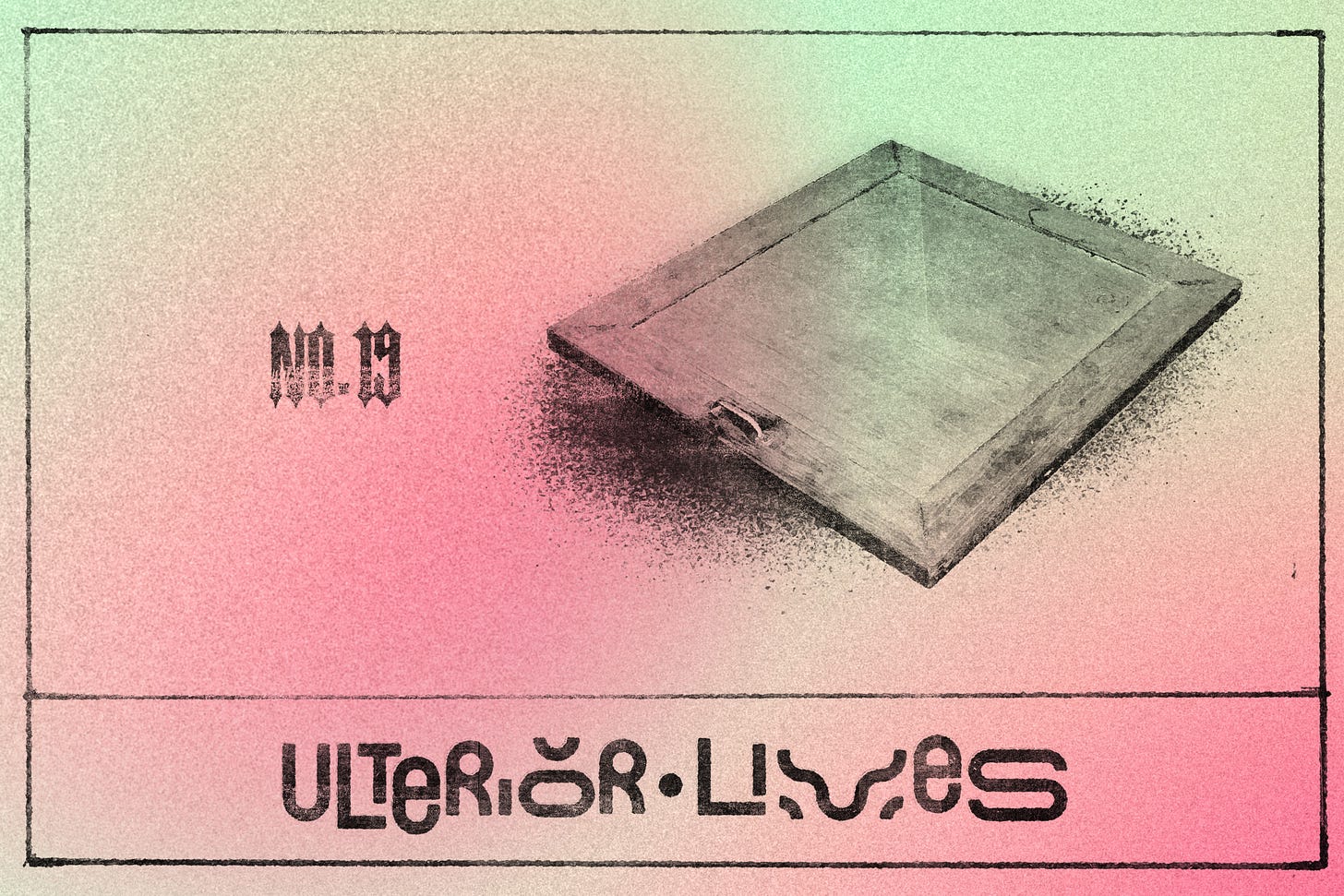Everything withers without mercy
In order to stay vital, a Rule of Life keeps trapdoors in every room.
Part 19 of our Ulterior Lives series: A Slow Research Project into The Outsider Politics of Monasticism. Read the introduction here.
Here are two stories that bear a certain resemblance and a telling difference.
In the first tale a certain monk is found guilty of wrong-doing, so the others call for a well regarded hermit named Moses to come and judge the situation. At first, Moses ignores the request, but after persuasion he finally wanders over. When he arrives the monks see that he is carrying an old basket full of sand which is running out of the many holes as he goes. The monks ask him what he’s doing and he replies: “My sins run out behind me and I do not see them and I have come here today to judge another.” There is no more said. Moses returns to his cell and the monks forgive the errant brother.
In the second tale, two monks fall into an argument. One strikes the other and the other fights back. And so they are interrogated before the community by none other than St Pachomius, author of the first monastic Rule. One culprit is given a week’s excommunication, and the other — the one who struck first — is to be permanently expelled. But then an elderly member of the community named Gnositheos speaks up. He says, “I, too, am a sinner and am leaving with him. If anyone is without sin, let him remain here.” At this, all the other monks follow the old man, saying, “We are also sinners and we are going with him.” Pachomius immediately regrets his decision. He runs in front of them, throws himself onto the ground and asks their forgiveness.
What these stories have in common is the ethic of non-judgement and its corresponding rationale: that none are without sin and so no one really has any grounds to play the judge. The only recourse in both tales is a wide-reaching forgiveness. But there is a crucial difference. The difference lies in which party upholds this ethic, and which party must be reminded of it. In this respect the two tales are diametrically opposed.
The first tale is recorded in The Saying of the Desert Fathers. The community calls on one of the hermits to judge the issue because they have no formalised Rule for Life, no established hierarchy or penal code. They are obliged to improvise within the web of relations available to them, so they ask the hermit Moses to help, though he has no formal authority to do so. In this case it is this unofficial adjudicator who upholds the ethic of non-judgement and forgiveness against the community who are hoping for punitive justice.
The second tale comes to us from an ancient biography of St Pachomius. As the formal Superior of a community bound by a Rule, Pachomius executes the penal code which is, no doubt designed to maintain a peaceable community by rehabilitating or excluding troublesome or dangerous individuals. Now everything has flipped. The boot is on the other foot. It is no longer the one appointed judge who upholds the ethic of non-judgement and forgiveness, but rather the community. Now that there is both rule and hierarchy, the community must always live with the possibility of subjection to oppressive force. They must now contend for this merciful social ethic against the Superior’s potential (mis)use of the Rule as a managerial mechanism of order and control.
A Rule of Life makes certain things possible that would be very difficult otherwise, but it also fundamentally changes the game by introducing a structural power with responsibility for order. In the Pachomian Rule there is a sense in which the Monk is being watched by something other than God and self. As the Rule says, “No one shall sleep in a locked cell… No one shall shave his head without his housemaster’s permission… or, go outside the monastery wall, without requesting and receiving the housemaster’s permission… And they may not, in any circumstance, talk in the monastery about what they have done or heard outside.” Toward the peace that comes with good order there is an acceptance that life will be, to some degree, enclaved, controlled, managed.
Note that the hermit Moses also exercises an enigmatic kind of power and responsibility. He does so by formally refusing both. Of course, the potential problems of power and responsibility are the very things the second tale exists to illuminate. Pachomius is the butt of the joke. Pachomius, the community’s Superior and author of the Rule, buries his face in the dirt before them all. He ends up asking for their forgiveness for his excessive use of power. This, now, will always be a possibility, and that is part of the pact. A tale like this exists as a kind of trapdoor which drains power wherever it gets frozen, encoded in a chain of command. Such is the way story, in its complexity, sometimes functions against unyielding code. In order to stay vital, a Rule of Life must keep trapdoors in every room.
What if you weren't afraid?
From the FaithJustice Bible Podcast: Luke 12:32-48 — Jesus understands that it is fear that underlines the unjust accumulation of wealth; here he sets aim at that root cause.







